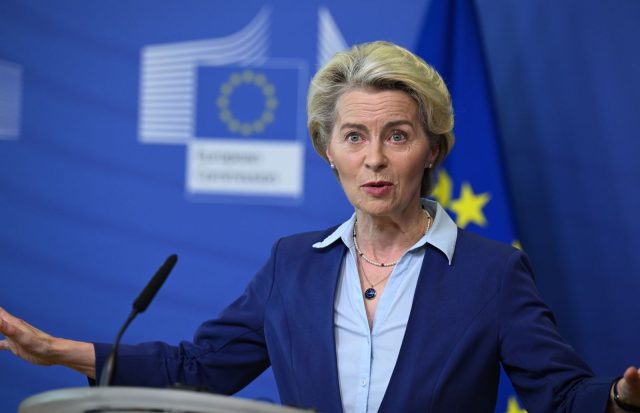
In her State of the Union, Ursula von der Leyen chose to open on a somber note: “Europe is engaged in a struggle… We can be certain: it is a struggle for our future.” The horizon is an unforgiving world marked by wars, rivalries, and strategic dependencies. Hence the manifesto: “It is time for Europe to become independent”—in defense, technology, energy, and alliances.
Defense and Ukraine: industry and realism
The most concrete part of the speech was security. To support Kyiv and close the industrial gap with Moscow, the Commission proposes a “Reparations Loan” financed by the proceeds from frozen Russian assets and a “Qualitative Military Edge” for Ukrainian forces, with a focus on drones. Brussels will “frontload €6 billion” and launch a Drone Alliance with Ukraine. On the EU side, “Readiness 2030” could mobilize up to €800 billion for defense; the SAFE program is “ready to provide €150 billion” for joint procurement. “Europe will defend every square inch of its territory.”
Gaza and Israel: a divisive shift
Von der Leyen called the situation in Gaza “unacceptable” and announced a change of course: “We will suspend our bilateral support to Israel… We will propose sanctions on extremist ministers and violent settlers, and the partial suspension of the association agreement on trade-related matters.” At the same time, “there will never be a place for Hamas,” with a call for a ceasefire and the release of hostages. A line that is likely to spark political friction among European capitals.
Migration and borders: order returns
On irregular flows, the President embraced effectiveness: “It is not acceptable that only 20% of those without the right to stay actually leave Europe.” She called for a common return system, full implementation of the Pact, and a sanctions regime against smugglers and traffickers—“following the money,” with asset freezes and travel restrictions. “Europe is our home; we decide who enters.”
Competitiveness, energy, single market
On the economy, the goal is industrial acceleration: European AI and cloud, Scaleup Europe to retain capital and talent, and a single-market roadmap through 2028 on capital, services, energy, and telecommunications (“if something can be measured, it can be delivered”). For energy networks, Brussels announced “energy highways” and the unblocking of eight bottlenecks “from the Øresund Strait to the Strait of Sicily.”
The institutional move: farewell to unanimity?
In governance, the most controversial proposal: “It is time to free ourselves from the chains of unanimity” and shift to qualified majority voting in some areas, “for example in foreign policy,” to “act more swiftly.” It promises faster decisions—but also risks deeper splits and weaker protection of national sovereignty.
The balance sheet: strengths and unresolved knots
Strengths. At last, a language of power: investment in defense, European value chains, attention to border security. The drone strategy and the use of income from frozen Russian assets signal operational realism; the push on risk capital and market integration is also welcome—indispensable to revive growth and real wages.
Unresolved knots. The EU remains weighed down by expensive energy and over-regulation: without a shock of simplification and a genuinely technology-neutral competitiveness agenda, the relaunch risks remaining on paper. The line on Israel—between suspensions and sanctions—looks punitive toward a key ally in the fight against terrorism, with a high likelihood of internal divisions. Finally, doing away with unanimity in foreign policy could morph into centralism that distances peoples from strategic choices.
The key line—and the test of facts
Von der Leyen condensed her recipe into one motto: “It is time for Europe to become independent.” That ambition requires three things: credible military power (without duplicating NATO), borders under control with effective returns, and a complete single market that unleashes capital, innovation, and enterprise. Everything else—from Gaza to voting reform—demands prudence: the Europe of nations holds together only if nations remain protagonists. The test now is to turn announcements into action.



 Subscribe
Subscribe